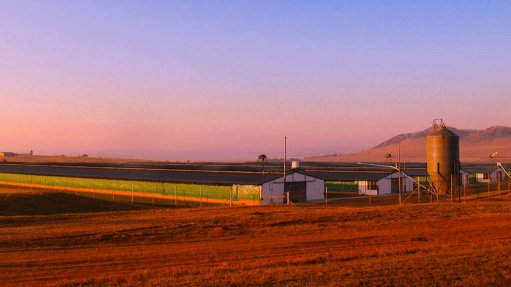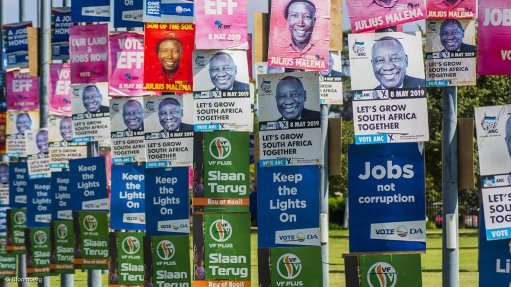AECOM employees are supported to advance Sustainable Legacies
This article has been supplied as a media statement and is not written by Creamer Media. It may be available only for a limited time on this website.
Globally trusted infrastructure firm AECOM offers numerous opportunities for employees to make a positive and tangible impact. From learning and development programmes that help staff advance their careers, to the ability to gain international experience, AECOM supports its workforce to pursue their passions and make their mark.
This is especially true of Associate Scientist Mohamed Abdelmegeed, who joined the firm eight years ago and has 24 years’ postgraduate experience in the water sector. “What attracted me to AECOM in the first place is its professionalism and high-level of experience. I believe it is very important for an employer to promote personal and career development."
Investing in human capital ensures employees gain experience and new skills. In the long run, this reflects on the company’s overall performance. Highly skilled and motivated employees mean the company can carry out ever more complex projects at a consistently high-level of professionalism. “If you cannot maintain that level, you cannot be competitive in the marketplace,” says Mohamed.
Mohamed began his career in Egypt and has completed assignments in Belgium, Brazil and Saudi Arabia. “AECOM gave me the opportunity to interact with other offices and work on overseas projects, which opened up doors for me. Even though I have diversified international experience, there is always room for improvement.
“Through working on different continents, I gained invaluable experience and exposure to different cultures and projects, and even different technical standards,” comments Mohamed. “These experiences helped me identify the technical career path I have pursued at AECOM.”
His first project in South Africa in 2014 was designing the Southern Wastewater Treatment Works – Sludge Treatment for eThekwini Municipality in KwaZulu-Natal, which resulted in him pursuing problems related to sludge treatment, disposal and reuse as a topic for his Master’s degree.
“It was a personal dream of mine to pursue my Master’s and AECOM afforded me this opportunity. On the back of this I was introduced to highly influential global research teams. This has added to my own experience and allowed me to give back to AECOM in the form of my own research output,” highlights Mohamed.
Personal development is a key part of AECOM’s Sustainable Legacies strategy to nurture its own skills base to be able to contribute to community empowerment through the projects and clients it engages with. “Personal development translates into both skills and actual experience,” says Mohamed.
He points to AECOM University and its Technical Practice Groups (TPGs) as an excellent example of this approach, where scientists such as himself, can join technical groups to gain more experience and perspective in their particular fields, including being assigned tailormade training. “When it comes to developing well-rounded engineers, AECOM is doing really well.”
An important aspect of Sustainable Legacies is understanding clients’ needs. “There is no such thing as one-size-fits-all. Every client comes with their own challenges, so you have to look at them individually. Even in the same country, different municipalities can present different challenges,” says Mohamed.
Despite working for AECOM in South Africa, Mohamed was the mechanical and hydraulics design lead for a series of pump stations in Saudi Arabia ranging from 18 m3/s to 35 m3/s. He has also been the process design lead for the Itare Dam Water Supply Project for Rift Valley Services Board and
CMC di Ravenna South Africa in Nakuru, Kenya, which involved the detailed design of a 105 Ml/day surface water treatment plant.
Mohamed’s local experience includes providing professional engineering services for upgrading the Temba Water Treatment Works in Tshwane in 2018. The 60 Ml/d extension included sedimentation, dissolved air flotation, sand filtration, ozone, biological activated carbon filtration and disinfection by chlorination.
Another important project undertaken for Umgeni Water was the Elysium Seawater Desalination Plant. “While reverse osmosis is not a new process, it was a novel technology for the region,” notes Mohamed. The aim of the project was to investigate an alternative source of fresh water for areas experiencing shortages.
Mohamed is essentially a process engineer, a role akin to being the ‘maestro’ on a project. “We size the plant process units, check the hydraulics, select equipment and design the piping and layout. Then we start to engage with other disciplines such as civil, structural and electrical in order to end up with a fully operational plant.”
Process engineers are by nature multidisciplinary, as they need to understand the basics of all the other engineering disciplines to see the bigger picture. “Water and wastewater engineering is not as simple as it seems,” notes Mohamed. It is a challenging field encompassing potable or drinking water treatment, as well as treating wastewater from industries as diverse as sugar, tanneries and textiles.
In terms of the latest trends in water and wastewater treatment, Mohamed points to treating contaminants of emerging concern, ranging from personal care products to domestic cleaning products and even medications, which require advanced oxidation technology. Another major trend is treating sewage to a potable standard to conserve water resources.
Numerous complexities and challenges are brought to bear in terms of treating water for pollutants, whether for reuse or just discharging it into the environment. “That is what attracted me to the sector in the first place,” reveals Mohamed. “Apart from the challenges, it is also highly fulfilling as you are confronted with something new every day.”
In May last year, AECOM announced the next phase of Sustainable Legacies, its industry-leading environmental, social and corporate governance (ESG) strategy. The aim is to advance sustainability initiatives that deliver positive impact both at AECOM and in communities around the world.
The strategy integrates four key pillars that embed sustainable development and resilience across the company’s work, improve social outcomes for communities, achieve net-zero carbon emissions and enhance its governance. Included in the updated strategy are more ambitious net zero targets that are among the first in the world to be approved by the Science-Based Targets initiative.
Comments
Press Office
Announcements
What's On
Subscribe to improve your user experience...
Option 1 (equivalent of R125 a month):
Receive a weekly copy of Creamer Media's Engineering News & Mining Weekly magazine
(print copy for those in South Africa and e-magazine for those outside of South Africa)
Receive daily email newsletters
Access to full search results
Access archive of magazine back copies
Access to Projects in Progress
Access to ONE Research Report of your choice in PDF format
Option 2 (equivalent of R375 a month):
All benefits from Option 1
PLUS
Access to Creamer Media's Research Channel Africa for ALL Research Reports, in PDF format, on various industrial and mining sectors
including Electricity; Water; Energy Transition; Hydrogen; Roads, Rail and Ports; Coal; Gold; Platinum; Battery Metals; etc.
Already a subscriber?
Forgotten your password?
Receive weekly copy of Creamer Media's Engineering News & Mining Weekly magazine (print copy for those in South Africa and e-magazine for those outside of South Africa)
➕
Recieve daily email newsletters
➕
Access to full search results
➕
Access archive of magazine back copies
➕
Access to Projects in Progress
➕
Access to ONE Research Report of your choice in PDF format
RESEARCH CHANNEL AFRICA
R4500 (equivalent of R375 a month)
SUBSCRIBEAll benefits from Option 1
➕
Access to Creamer Media's Research Channel Africa for ALL Research Reports on various industrial and mining sectors, in PDF format, including on:
Electricity
➕
Water
➕
Energy Transition
➕
Hydrogen
➕
Roads, Rail and Ports
➕
Coal
➕
Gold
➕
Platinum
➕
Battery Metals
➕
etc.
Receive all benefits from Option 1 or Option 2 delivered to numerous people at your company
➕
Multiple User names and Passwords for simultaneous log-ins
➕
Intranet integration access to all in your organisation

















